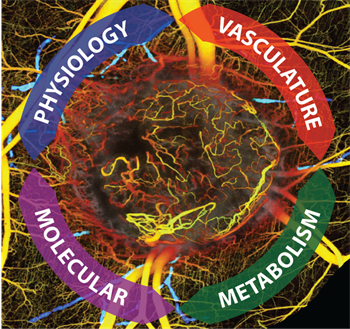The Lanning Lab
Department of Radiation Oncology
The Lanning lab uses optical frequency domain imaging (OFDI) to elucidate in vivo longitudinal and microscopic changes in the tumor microenvironment (TME). OFDI uses near-infrared light to measure tissue scattering through time-of-flight techniques. Based on these principles and through the added use of Doppler techniques, OFDI is able to image tissue microstructure and vasculature (blood vessels and lymphatics) at high 3D-resolution without the use of exogenous agents. The application of these capabilities is capable of studying the anatomical and physiologic response of murine solid tumor models to vascular and cellular-targeted therapies. Our lab uses OFDI specifically to study and describe changes to the TME by cytotoxic, targeted and radiation therapies in several mouse models of brain, breast, and skin cancer.


Ryan Lanning, MD, PhD is the Principle Investigator, and an Assistant Professor in the Department of Radiation Oncology at the University of Colorado Anschutz School of Medicine. His academic training consisted of dual Bachelor Degrees in Biology and Chemistry at The University of California at Irvine, a PhD in Medical Engineering at the Massachusetts Institute of Technology under the supervision of Prof. Rakesh Jain (a pioneer in the field of tumor angiogenesis and intravital imaging of the tumor microenvironment), a MD from Harvard Medical School, and Residency training in Radiation Oncology from Memorial Sloan Kettering Cancer Center. Dr. Lanning’s laboratory focuses on the development of intravital and molecular imaging techniques to study the tumor microenvironment with the goal of direct translation of these technologies to the clinic.
If you’re interested in learning more about out lab, please contact Mandy Whitton: [email protected]
For a list of Dr. Lanning's previous publications click here.
 To find out more about our collaborators at the Center for OCT Biomedical Research click here.
To find out more about our collaborators at the Center for OCT Biomedical Research click here.